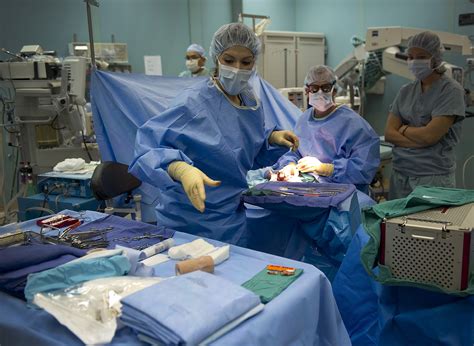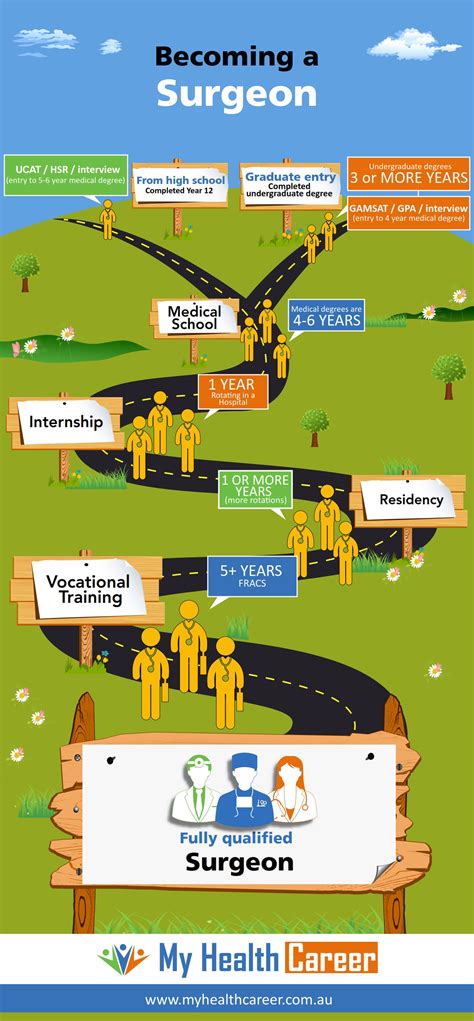The world of medicine holds endless possibilities for those who possess a burning passion to heal and a relentless determination to make a difference in the lives of others. Within this vast realm, the field of surgery serves as a captivating avenue for those who yearn to explore the intricacies of the human body, the art of precision, and the thrill of saving lives. This article sets the stage for individuals who dare to dream of a future as a skilled surgeon, offering a comprehensive roadmap to navigate the winding path towards a successful medical career.
As you delve into the realm of surgical medicine, a symphony of words dance across the stage of your mind - curiosity, dedication, discipline. These virtues, like a surgeon's scalpel, will shape you into a master of your craft. You shall learn to wield knowledge as a weapon against disease, to suture wounds with skillful finesse, and to cultivate a disposition of compassion that intertwines seamlessly with scientific expertise.
From the shores of academia to the operating theaters of the world, this guide will illuminate the step-by-step journey towards becoming a surgeon. Together, we shall embark on a voyage through the labyrinth of studies, training, and personal growth required to wield the coveted title of surgeon. Prepare to encounter inspiring tales of perseverance, garner invaluable insights from seasoned professionals, and equip yourself with the essential tools to embark on this extraordinary expedition.
Exploring the Vast Realm of Surgery

Embarking on a journey to explore the captivating world of surgery is a pathway to witness the intricate artistry of the human body and the transformative power of medical interventions. In this section, we delve into the multifaceted aspects of surgery, encompassing its diverse specialties, groundbreaking innovations, and ethical considerations.
1. Diverse Specialties: Surgery encompasses a wide array of specialties that focus on specific areas of the human body or specific patient populations. These specialties include Orthopedic Surgery, Neurosurgery, Cardiothoracic Surgery, Plastic Surgery, and many more. Each specialty requires unique skills and expertise, offering surgeons the opportunity to specialize in their area of passion.
2. Groundbreaking Innovations: The field of surgery is constantly evolving with innovative technologies and techniques that enhance patient outcomes and revolutionize surgical procedures. From minimally invasive surgeries and robotic-assisted procedures to advanced imaging technologies and precision medicine, surgeons continuously adapt to the latest advancements to provide optimal care for their patients.
3. Ethical Considerations: Surgery is not just about the technical mastery of operating on the human body; it also involves ethical reflections. Surgeons face complex decisions related to informed consent, patient autonomy, resource allocation, and end-of-life care, among other ethical dilemmas. Understanding and navigating these ethical considerations is crucial for every aspiring surgeon.
4. Invaluable Teamwork: Surgery is a collaborative effort that relies on a proficient and coordinated team. Surgeons work alongside an interdisciplinary team, including anesthesiologists, nurses, surgical technologists, and other healthcare professionals, to ensure seamless patient care. Building effective communication and teamwork skills is essential for success in the surgical field.
5. Continuous Learning: The field of surgery requires a commitment to lifelong learning and professional development. Surgeons must keep up with the latest research, attend conferences, and engage in continuous education to stay at the forefront of medical advancements. Embracing a growth mindset and a dedication to ongoing learning is essential for a fulfilling surgical career.
Embark on this exploration of surgery, and uncover the vast opportunities, challenges, and rewards that await those who aspire to make a difference through the art and science of surgical interventions.
Preparing for Entry into Medical School
In this section, we will explore the essential steps and considerations involved in readying oneself for admission to medical school. The journey towards a medical career requires careful planning, diligent effort, and a strong commitment to academic and personal growth.
1. Prerequisites and Academic Excellence
One of the fundamental requirements for gaining admission to medical school is completing the necessary prerequisites. These prerequisite courses typically encompass a broad range of subjects, such as biology, chemistry, physics, and mathematics. Achieving excellence in these courses demonstrates your dedication to a comprehensive understanding of the scientific foundation necessary in the field of medicine.
2. Volunteering and Clinical Experience
While a solid academic background is essential, medical schools also value firsthand experiences in healthcare settings. Volunteering at hospitals, clinics, or community health centers provides valuable insights into the medical field and demonstrates your commitment to serving others. It allows you to develop important skills such as effective communication and empathy, which are vital for a future career as a surgeon.
3. Research and Publications
Engaging in research not only enhances your understanding of medical science but also showcases your intellectual curiosity and ability to contribute to the advancement of the field. Seek out opportunities to participate in research projects, collaborate with faculty members, and aim to publish your findings in reputable journals. These experiences will distinguish you as a passionate and proactive medical student.
| 4. Letters of Recommendation | 5. MCAT Preparation |
|---|---|
| Letters of recommendation are a crucial component of the medical school application. Cultivate strong relationships with professors, mentors, and healthcare professionals who can provide meaningful insights into your character, work ethic, and suitability for a medical career. | The Medical College Admission Test (MCAT) is a standardized exam that assesses your knowledge and critical thinking skills in areas such as biology, chemistry, physics, and psychology. Devote ample time to studying and preparing for this exam to achieve a competitive score. |
6. Extracurricular Activities and Leadership
Medical schools seek well-rounded individuals who have been actively involved in extracurricular activities. Engage in clubs, organizations, or sports teams that interest you and demonstrate your ability to manage time effectively. Holding leadership positions within these endeavors showcases your capacity for teamwork, organization, and decision-making.
7. Personal Statement and Interview Preparation
Compose a compelling personal statement that reflects your motivations, experiences, and aspirations in becoming a surgeon. Utilize the essay to convey your unique perspective, passion for medicine, and relevant life experiences. Additionally, prepare for medical school interviews by practicing common interview questions and familiarizing yourself with the interview format.
By following these recommendations and dedicating yourself to a well-rounded and comprehensive preparation for medical school, you will significantly increase your chances of realizing your aspiration to become a skilled and compassionate surgeon.
Choosing the Right Path in Medical Education

When embarking on the journey to become a surgeon, one of the most crucial decisions you will make is choosing the right medical school. This decision sets the foundation for your future as a medical professional and greatly impacts your training, opportunities, and overall experience in the field. With a myriad of options available, selecting the ideal medical school can be a daunting task, but with careful consideration and research, you can make an informed decision that aligns with your aspirations and goals.
First and foremost, it is essential to determine your desired field of medicine within the broader scope of surgery. Whether it be general surgery, orthopedics, neurosurgery, or another specialty, understanding your specific interest is pivotal in selecting a medical school that offers comprehensive training and resources in your chosen area. Consider researching renowned surgeons and their affiliations to find programs that align with your aspirations.
Another crucial factor to consider when choosing a medical school is its accreditation and reputation. Accreditation ensures that the institution meets the necessary standards and delivers a quality education. Additionally, reputation plays a significant role in the opportunities that may be available to you after graduation. Medical schools with strong reputations often have established connections with reputable hospitals, research institutions, and fellow clinicians, which can greatly enhance your training and professional development.
It is equally important to assess the curriculum and teaching methods employed by potential medical schools. Look for programs that offer a balanced blend of didactic lectures, hands-on experiences, and clinical rotations. The integration of practical training into the curriculum fosters a comprehensive learning experience and prepares you for the challenges you will face as a surgeon. Investigate the faculty's expertise and their commitment to mentorship and guidance, as these factors can significantly impact your growth as a medical student.
Furthermore, the location and culture of the medical school should also be taken into account. Consider your personal preferences regarding urban or rural settings, climate, and lifestyle. A conducive learning environment that aligns with your lifestyle and promotes a healthy work-life balance can greatly enhance your educational experience and overall well-being. Take the time to visit potential schools, speak with current students, and immerse yourself in the community to gain a deeper understanding of what each institution can offer you.
In conclusion, choosing the right medical school is a vital step towards fulfilling your dream of becoming a surgeon. By considering factors such as your desired specialty, accreditation, reputation, curriculum, teaching methods, and location, you can make an informed decision that sets the stage for a successful and fulfilling medical career.
Navigating the Journey through Medical School
Embarking on the path to a fulfilling career in medicine involves a comprehensive and intricate journey that requires perseverance, dedication, and meticulous planning. This section aims to provide valuable insights and guidance for aspiring medical professionals as they navigate the complexities of medical school, equipping them with the necessary tools to flourish throughout their educational journey.
1. Setting Your Course
- Research and explore various medical schools to find the one that aligns with your aspirations and goals.
- Consider factors such as location, curriculum, reputation, faculty, and available resources.
- Prepare yourself academically by completing prerequisite courses and taking the necessary standardized exams such as the MCAT.
2. Crafting a Stellar Application
- Showcase your passion for medicine through a well-written personal statement that highlights your unique experiences and motivations.
- Obtain strong letters of recommendation from professors, advisors, or healthcare professionals who can attest to your aptitude and character.
- Highlight your academic achievements, extracurricular activities, and community involvement to demonstrate a well-rounded application.
3. Adapting to the Rigors of Medical School
- Develop effective study techniques and time management skills to handle the demanding coursework.
- Seek out opportunities for research, clinical experiences, and shadowing to enhance your understanding of the medical field.
- Build a strong support network through forming study groups, participating in student organizations, and seeking mentorship.
4. Navigating Clinical Rotations
- Embrace the hands-on learning experience during clinical rotations, which allow you to apply theoretical knowledge in real-life medical scenarios.
- Show professionalism, empathy, and effective communication skills when interacting with patients, colleagues, and healthcare professionals.
- Continuously learn from each rotation, seeking feedback and actively refining your clinical skills.
5. Preparing for Residency
- Research and choose the residency specialty that aligns with your interests and long-term career goals.
- Gain valuable experience in your chosen field through elective rotations, research projects, and externships.
- Prepare a compelling residency application that showcases your achievements, skills, and dedication to the specialty.
By following these navigational milestones, aspiring medical professionals can confidently chart their course through the intricacies of medical school, enabling them to transform their dreams into a reality in the dynamic and rewarding field of medicine.
Specializing in the Field of Surgical Medicine

Once you have embarked on your journey towards a career in medicine, you will undoubtedly come across various opportunities to specialize in a specific branch of the medical field. For those with a passion for the intricacies and challenges of surgery, specializing in surgical medicine can be an incredibly rewarding path to follow.
Specializing in surgery allows medical professionals to become experts in performing invasive procedures and operations, utilizing their extensive knowledge of anatomy, physiology, and patient care. Surgeons play a critical role in diagnosing and treating a wide range of medical conditions and injuries, ranging from routine surgeries to complex, life-saving interventions.
Within the field of surgical medicine, there are numerous areas of specialization to consider. These specialties can include but are not limited to general surgery, orthopedic surgery, neurosurgery, cardiovascular surgery, plastic surgery, and pediatric surgery, among others.
Each specialization offers its unique challenges and opportunities, catering to different patient populations and medical needs. For instance, orthopedic surgeons focus on the musculoskeletal system, treating conditions such as broken bones, joint injuries, and spinal deformities, while plastic surgeons specialize in enhancing and reconstructing various aspects of the body.
Choosing a specialization in surgical medicine requires careful consideration of your interests, aptitude, and future career goals. It is crucial to research each specialty, gain exposure through shadowing or elective rotations, and engage with professionals working in the field to better understand the demands and rewards of each path.
| Specialty | Description |
| General Surgery | Offers a broad range of surgical procedures, including abdominal, breast, and endocrine surgeries. |
| Orthopedic Surgery | Focuses on the musculoskeletal system, treating conditions such as fractures, sports injuries, and arthritis. |
| Neurosurgery | Specializes in surgical interventions related to the nervous system, including the brain and spinal cord. |
| Cardiovascular Surgery | Concentrates on surgical procedures involving the heart and blood vessels, such as bypass surgeries and valve replacements. |
| Plastic Surgery | Focuses on enhancing and reconstructing various aspects of the body, including cosmetic and reconstructive procedures. |
| Pediatric Surgery | Specializes in surgical procedures performed on children, addressing congenital anomalies and other pediatric conditions. |
By specializing in surgery, you have the opportunity to make a significant impact on the lives of your patients, improve their quality of life, and contribute to the advancement of medical science. The path towards specialization requires dedication, perseverance, and a lifelong commitment to learning and professional growth.
Building a Path to Success in the Field of Surgery
Embarking on a career as a surgeon requires dedication, perseverance, and a relentless pursuit of excellence. This section aims to provide valuable insights and guidance on how to establish a successful career in the surgical field, encompassing various aspects such as education, training, specialization, and professional growth.
To lay the foundation for a thriving surgical career, it is essential to acquire a comprehensive medical education. This involves completing an undergraduate degree in a relevant field, followed by admission to a reputable medical school. The rigorous coursework in medical school will equip aspiring surgeons with the fundamental knowledge and skills required for their future profession.
After obtaining a medical degree, the next crucial step is to undertake a specialized surgical residency program. This hands-on training period allows aspiring surgeons to refine their technical abilities, enhance their decision-making skills, and gain exposure to a broad range of surgical procedures. A residency program provides the opportunity to work under the guidance of experienced surgeons, fostering mentorship and fostering the development of expertise in a specific surgical field.
While a broad foundation is crucial, aspiring surgeons often find it advantageous to pursue fellowship programs to further specialize in a specific surgical subspecialty. This additional training enhances their knowledge and expertise in a specific area, positioning them as sought-after professionals in their chosen field.
Building a successful surgical career also entails continuously striving for professional growth and advancement. Staying up-to-date with the latest medical advancements through attending conferences, workshops, and seminars is crucial in ensuring a surgeon remains at the forefront of their field. Actively engaging in research and contributing to scientific literature further solidifies their credibility and expertise.
Networking and building professional relationships with colleagues and mentors is equally important. Collaborating with other surgeons not only fosters learning and knowledge exchange but may also open doors to new opportunities and career advancements. Establishing a strong professional reputation and maintaining a positive work ethic also play a vital role in the trajectory of a successful surgical career.
In conclusion, building a successful surgical career requires a combination of formal education, specialized training, continual professional growth, and cultivating professional relationships. By following a strategic path, aspiring surgeons can pave the way for achieving their goals and making a significant impact in the field of surgery.
FAQ
What does it take to become a surgeon?
Becoming a surgeon requires many years of education and training. Firstly, you need to complete a Bachelor's degree, preferably in a science-related field. After that, you must attend medical school and earn a Doctor of Medicine (M.D.) or Doctor of Osteopathic Medicine (D.O.) degree. Following medical school, you will undergo a surgical residency program, which typically lasts 5-7 years. During residency, you will gain hands-on experience, learn from experienced surgeons, and specialize in a specific area of surgery. Lastly, you will need to obtain a license to practice medicine in your jurisdiction.
What are some important qualities or skills an aspiring surgeon should have?
As an aspiring surgeon, it is crucial to possess certain qualities and skills. Firstly, you need to have excellent hand-eye coordination, as surgical procedures require precision and delicacy. Additionally, good problem-solving and critical thinking skills are essential, as you will often need to make quick decisions in high-pressure situations. Strong communication skills are also vital when working with patients, their families, and other healthcare professionals. Lastly, dedication, perseverance, and a strong work ethic are necessary to navigate the rigorous and demanding path to becoming a surgeon.
What are the different types of surgeons?
There are numerous specialized fields within surgery. Some common types of surgeons include cardiothoracic surgeons, who perform operations on the heart, lungs, and other thoracic organs; orthopedic surgeons, who specialize in treating musculoskeletal conditions and injuries; neurosurgeons, who operate on the brain and nervous system; and general surgeons, who perform a wide range of surgical procedures. There are also surgeons specialized in areas like plastic surgery, pediatric surgery, urology, and many more. Your choice will depend on your interests and the type of patients you wish to treat.
What is the average salary of a surgeon?
The average salary of a surgeon can vary depending on factors such as experience, specialization, geographic location, and the type of healthcare setting. Generally, surgeons are among the highest-paid professionals in the medical field. According to recent data, the average annual income for surgeons in the United States ranges from $409,665 to $616,901. However, it is important to note that these figures can vary significantly, and some surgeons may earn even higher salaries, especially those with extensive experience and expertise in their specialty.





